Unit 10 英语短篇小说教程
- 格式:ppt
- 大小:256.50 KB
- 文档页数:15




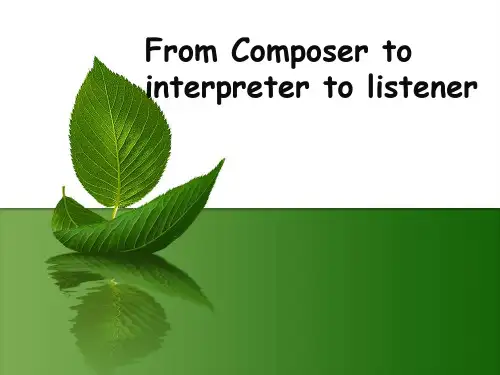
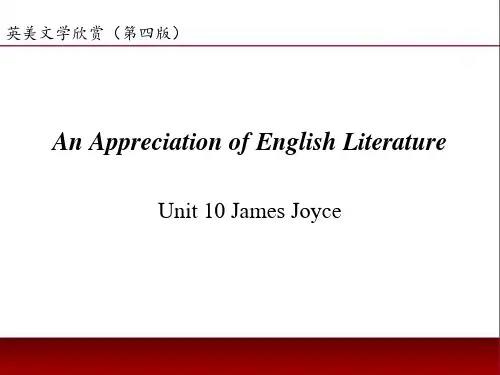
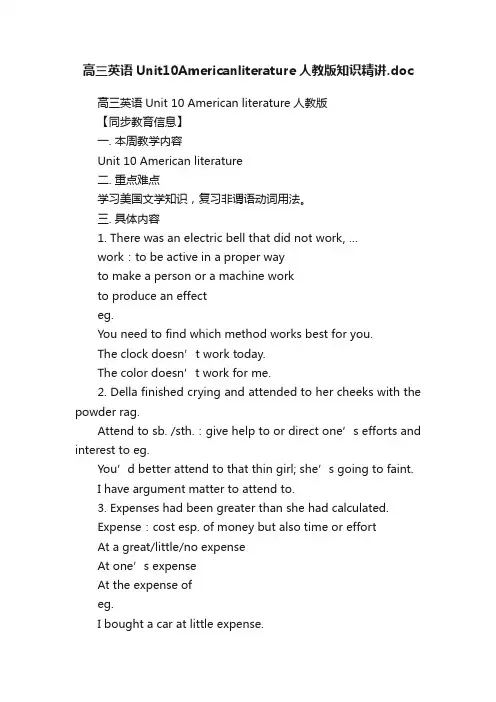
高三英语Unit10Americanliterature人教版知识精讲.doc高三英语Unit 10 American literature人教版【同步教育信息】一. 本周教学内容Unit 10 American literature二. 重点难点学习美国文学知识,复习非谓语动词用法。
三. 具体内容1. There was an electric bell that did not work, …work:to be active in a proper wayto make a person or a machine workto produce an effecteg.You need to find which method works best for you.The clock doesn’t work today.The color doesn’t work for me.2. Della finished crying and attended to her cheeks with the powder rag.Attend to sb. /sth.:give help to or direct one’s efforts and interest to eg.You’d better attend to that thin girl; she’s going to faint.I have argument matter to attend to.3. Expenses had been greater than she had calculated.Expense:cost esp. of money but also time or effortAt a great/little/no expenseAt one’s expenseAt the expense ofeg.I bought a car at little expense.He tried to be clever at my expense.He finished the job at the expense of his health.4. There were two possessions of the James Dillingham Youngs in which they both took great pride.Take pride in:eg.She took great pride in her brave son.5. It was worthy of the watch.Worth:be worthWorthy:be worthy ofWorthwhile:adj. worth doingeg.The person who doesn’t help others is not worth helping.He is worthy of dislike.The boss gave me a worthwhile job.【典型例题】[例1] I didn’t ______ the _____ seriousness of the country’s problems until I went there myself.A. realize; trueB. recognize; realC. realize; realD. recognize; true答案:A解析:前项所缺的词,同意为“意识到”,后项所缺的词,同意为真正的严重性,true 意为“真正的”,“与事实一致”的。
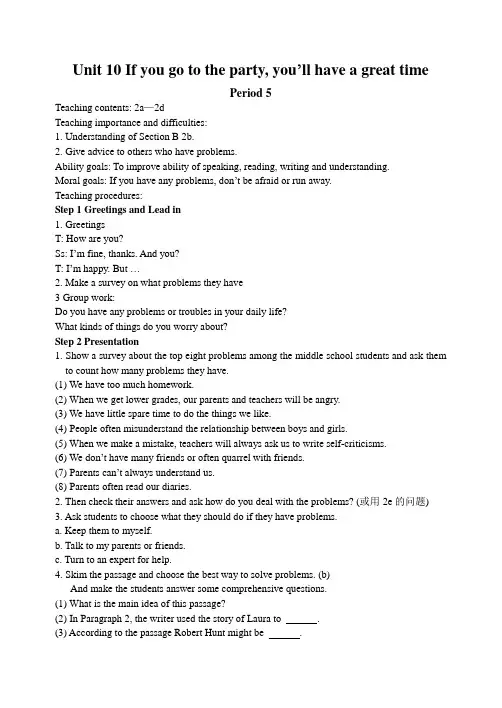
Unit 10 If you go to the party, you’ll have a great timePeriod 5Teaching contents: 2a—2dTeaching importance and difficulties:1. Understanding of Section B 2b.2. Give advice to others who have problems.Ability goals: To improve ability of speaking, reading, writing and understanding.Moral goals: If you have any problems, don’t be afraid or run away.Teaching procedures:Step 1 Greetings and Lead in1. GreetingsT: How are you?Ss: I’m fine, thanks. And you?T: I’m happy. But …2. Make a survey on what problems they have3 Group work:Do you have any problems or troubles in your daily life?What kinds of things do you worry about?Step 2 Presentation1. Show a survey about the top eight problems among the middle school students and ask them to count how many problems they have.(1) We have too much homework.(2) When we get lower grades, our parents and teachers will be angry.(3) We have little spare time to do the things we like.(4) People often misunderstand the relationship between boys and girls.(5) When we make a mistake, teachers will always ask us to write self-criticisms.(6) We don’t have many friends or often quarrel with friends.(7) Parents can’t always understand us.(8) Parents often read our diaries.2. Then check their answers and ask how do you deal with the problems? (或用2e的问题)3. Ask students to choose what they should do if they have problems.a. Keep them to myself.b. Talk to my parents or friends.c. Turn to an expert for help.4. Skim the passage and choose the best way to solve problems. (b)And make the students answer some comprehensive questions.(1) What is the main idea of this passage?(2) In Paragraph 2, the writer used the story of Laura to .(3) According to the passage Robert Hunt might be .5. 2c.Read the passage again and answer some more questions in detail.(1) What problems do students these days have?(2) For Laura, what helps a lot?(3) What did Laura’s parents do after she told them what happened?(4) In Robert’s opinion, what should we do best?Step 4 Finish 2dStep 5 SummaryIn our lifetime, we’ll meet different kinds of troubles. When troubles come, we can’t run away from them. We should face them bravely. After we solve our problems, we’ll find we learn a lot from them.Step 6 homeworkRead the passage 10 times. Write a short passage about your worries in life.。
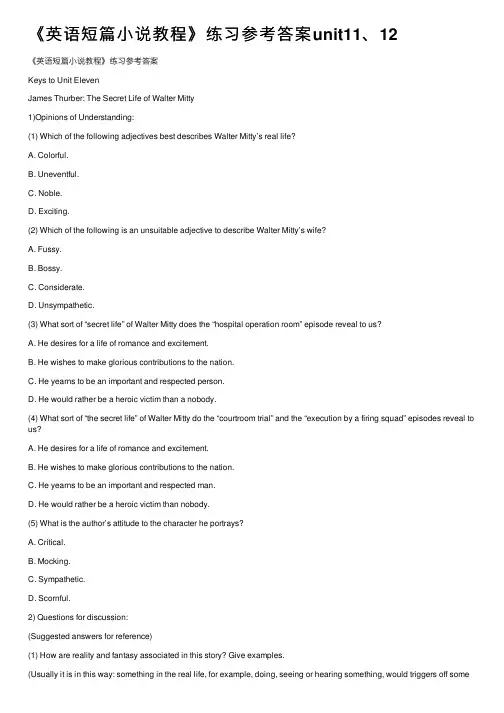
《英语短篇⼩说教程》练习参考答案unit11、12《英语短篇⼩说教程》练习参考答案Keys to Unit ElevenJames Thurber: The Secret Life of Walter Mitty1)Opinions of Understanding:(1) Which of the following adjectives best describes Walter Mitty’s real life?A. Colorful.B. Uneventful.C. Noble.D. Exciting.(2) Which of the following is an unsuitable adjective to describe Walter Mitty’s wife?A. Fussy.B. Bossy.C. Considerate.D. Unsympathetic.(3) What sort of “secret life” of Walter Mitty does the “hospital operation room” episode reveal to us?A. He desires for a life of romance and excitement.B. He wishes to make glorious contributions to the nation.C. He yearns to be an important and respected person.D. He would rather be a heroic victim than a nobody.(4) What sort of “the secret life” of Walter Mitty do the “courtroom trial” and the “execution by a firing squad” episodes reveal to us?A. He desires for a life of romance and excitement.B. He wishes to make glorious contributions to the nation.C. He yearns to be an important and respected man.D. He would rather be a heroic victim than nobody.(5) What is the author’s attitude to the character he portrays?A. Critical.B. Mocking.C. Sympathetic.D. Scornful.2) Questions for discussion:(Suggested answers for reference)(1) How are reality and fantasy associated in this story? Give examples.(Usually it is in this way: something in the real life, for example, doing, seeing or hearing something, would triggers off somefantasy. Driving a car leading to the fantasy of piloting a hydroplane; putting on gloves and hearing the name of Dr. Renshaw leading to the operation episode; hearing a newspaper boy shouting something about the trial leading to the courtroomepisode; sitting in the lobby and reading news about Second World War leading to the bomber-pilot episode and standing against the wall of a drug-store leading to the episode of facing a firing squad.)(2) Does Mitty appear to be a comic, grotesque, and ridiculous person?(It is not the author’s intention to show the ridiculous side of Mitty’s life. Through creation of such a character, the writer intends to reveal the unfortunate life of some city dwellers. Their lives, like that of Mitty’s, are suffocated by the monotony and triviality of the modern middle-class life. The daydreams seem to be the only escape from the meaning less repetition of the day-to-day existence.)(3) Find out what is in common in the five pieces of Mitty’s daydream: the hydroplane, the medical operation, the trial, the bomber and the execution. What do these fantasies reveal to you about Walter Mitty?(These pieces of daydreams have one thing in common in which life is more adventurous, more heroic or more exciting than the actual existence, and in which he is a brave, respected or even a tragic central figure, rather than a nobody dominated by an bossy wife.)(4) How do you like the ending of the story? What is your interpretation?(There is a tragic sense in the last episode – the man being executed. This may reveal the inner wish of the protagonist that he would rather be a heroic victim than a person of no significance. And also, there is a hint of tragedy in his life.)(5) Compare Walter Mitty with Cervantes’Don Quixode (唐·吉诃德). What similarities and differences do you find in the two characters?(Mitty’s daydreams embody the clichés of adventure or war fiction and movies. While Cervantes’ Don Quixode is also influenced by the popular romance of his time and ridiculously acts out his fantasies, Mitty does not even have courage to do that and seems satisfied with dreaming about a sort of heroism as an escape from the imprisonment in triviality. In this sense, he is a modern Don Quixode)3) Explanation and interpretation:(Explain the implied meaning of the following sentences, and point out their significance in the context of the story.)(1) He looked at his wife, in the seat beside him, with shocked astonishment. She seemed grossly unfamiliar, like a strange woman who had yelled at him in a crowd.(Mitty was lost in his daydream, and was suddenly awakened from it and the world around him seemed rather unfamiliar.)(2) "You're tensed up again," said Mrs. Mitty. "It's one of your days. I wish you'd let Dr. Renshaw look you over."(“Tensed up” refers to Mitty’s state of fantasizing. His wife’s words indicate that Mitty had a habit of falling into daydreams and had once consulted a doctor for this problem.)(3) He put them (gloves) on, but after she had turned and gone into the building and he had driven on to a red light, he took them off again.(He obeyed to his wife humbly, but when she did not see him, he book them off as and act of rebellion.)(4) "Back it up, Mac! Look out for that Buick!" Walter Mitty jammed on the brakes. "Wrong lane, Mac," said the parking-lot attendant.(He didn’t seem to be able to do anything well and even a parking lot attendant could order and criticize him. This adds to his sense of depression, of being nobody.)(5) Then, with that faint, fleeting smile playing about his lips, he faced the firing squad; erect andmotionless, proud and disdainful…(The last episode of the fantasy reveals the mixed feelings of being a victim and being a hero. The end seems inevitably tragic but to Mitty’s imagination, maintaining a sort of heroism is possible. Mitty felt that he was beaten down by life, but in his heart he still kept high aspirations.)Suggested HomeworkAllow Walter Mitty to continue his fantasy once he arrived home from the shopping trip with his wife. Using your imagination and write a paragraph that may begin like this:He parked his car. In a few quick steps, he rushed to the door and pushed it open with determined suddenness. “Hands up, gentlemen!” he said.For reference only:He parked his car. In a few quick steps, he rushed to the door and pushed it open with determined suddenness. “Hands up, gentlemen! ” he said, pointing his gun at the three men sitting there. “FBI. We have been following you for quite some time.”The men in the room were totally unprepared. Two raised their hands over their heads, one hesitated and quietly moved his right hand to a pistol on the coffee table. He aims his gun at that man, “push that pistol to me, slowly. That’s right. It’s no use trying to do anything funny, let me warn you.”“Why do walk so quickly and push open the door like this? Go back to get the things in the car!” his wife said angrily.《英语短篇⼩说教程》练习参考答案Keys to Unit TwelveDonald Barthelme: The Glass Mountain1) Questions for Discussion:(Suggested answers for reference)(1) Do you find anything unusual about the structure of the story? Why do you think the writer chooses this manner of narration?(Firstly, the title sounds strange – there is no “glass mountain” in the real world. Secondly, the short story is made up of 100 sentences and each sentence is numbered. The title, if one is familiar with European fairy tales, reminds one of a popular story. The structure is very unusual, subverting the established form of fiction writing and creating a false perfection with the story beginning at Sentence One and ending at Sentence One Hundred. The author seems to being mocking at the literary convention by inventing a form that looks grotesque. )(2) What sort of person is the narrator, the first-person “I” who tries to climb the glass mountain?(Judging from what goes on in his mind, we find that the climber might be an intellectual, or a writer, as he is familiar with fairy tales and talks about the definition of “symbol” etc. So, the climbing can be seen not as actual, but as imagined and psychological. He is very much dissatisfied with the reality down “at the bottom of the mountain,” but the fanciful “golden castle”is unattainable. He finds himself stranded in the middle. He represents the spiritual plight of the “Modern Man.”) (3) There are a lot of symbols in the story such as the glass mountain, the golden castle, the dead knights, the enchanted princess, the climber and the act of climbing. Can you try to explain their symbolic meanings?(The glass mountain: the modern city life, or the impossible process of achieving meaning The golden castle: an ideal goal that is nothing but illusionThe fallen knights: the dead or dying traditionThe enchanted princess: aim or reward of hard endeavorThe climber: a modern man in predicament, trying to achieve self-realizationThe climbing: the difficult and impossible process toward the goalThe street scene: the real city life of confusion and chaosThe climbing irons and plumber’s friends: the ridiculous means for the “grand” taskThe “acquaintances”: the uncultured, unmannered generation of people. )(4) How do you interpret the ending of the story?(Through imagination, with the eagle carrying him to up to the palace, the climber finally reaches the castle. But with his “golden touch,” the symbol changes into a princess, like cliché in old stories, and the climber is disappointed and disillusioned. He seems to have realized that the whole thing is nothing but fairy-tale fantasy.)(5) The whole story appears to be very absurd. What sort of reality can you see behind the apparent absurdity?(Despite the absurdity in the form and contents, we can find in the short story a lot of things that are related to the reality in the West, as the writer sees it:1. the narrator/climber’s sense of frustration and alienation2. the life of confusion and disorder in the city3. people’s inability to achieve a state of glory4. the loss of tradition5. the replacement of culture by hooliganism.6. the loss of aim and meaning in life with only imagined idealism which one knows is unrealizable.)2) Explanation and Interpretation:(Explain the implied meaning of the following sentences, and point out their significance in the context of the story.)(1) 18. The mountain towers over that part of Eighth Avenue like some splendid, immense office building.(“Eighth Avenue” suggests the location is a city, possibly New York, and the glass mountain is a glass-surfaced modern skyscraper. It indeed is an office building.)(2) 78. My acquaintances were debating the question, which of them would get my apartment?(They were certain that the climber “I” would inevitably fall and die in the end, like all the “knights.”)(3) 80. “At the same moment a door opened, and he saw a courtyard filled with flowers and trees, and there, the beautiful enchanted princess.” (The Yellow Fairy Book)96. At the same moment a door opened, and I saw a courtyard filled with flowers and trees, and there, the beautiful enchanted symbol.(In the popular fairy tale, the ultimate aim of the hero is to rescue the “princess,” but the modern climber found it to be no more than a mere “symbol,”– something abstract, remote, and devoid of solid meaning.)(4) 97. I approached the symbol, with its layers of meaning, but when I touched it, it changed into only a beautiful princess.(A symbol can be interpreted differently – with its layers of meaning, but the popular culture points to only one direction of interpretation. The symbol of happy ending, as in numerous tales, is represented by the union of the brave and the beautiful:“the youth married the princess and lived happily ever after.” The climber seems to dislike this kind of wishful fantasy.)(5) 98. I threw the beautiful princess headfirst down the mountain to my acquaintances.(Obviously, this is an act of great disappointment. The climber seems to be totally disillusioned at the outcome, having realized the impossibility and futility of such an attempt. Hesubverts his own purpose of trying to achieve something heroic or glorious.)。

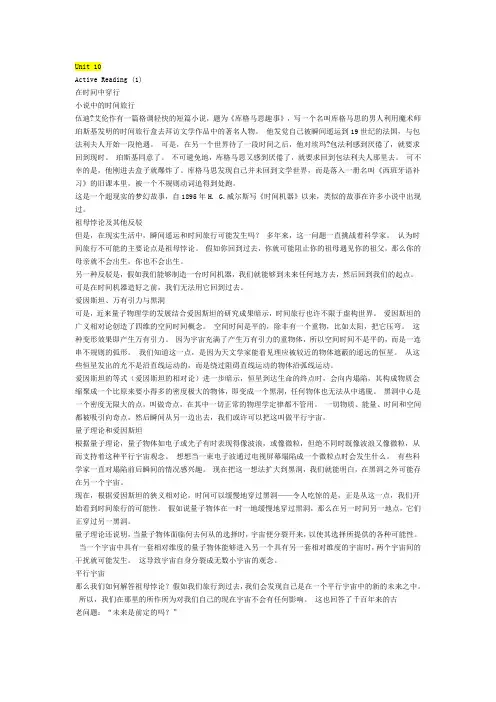
Unit 10Active Reading (1)在时间中穿行小说中的时间旅行伍迪?艾伦作有一篇格调轻快的短篇小说,题为《库格马思趣事》,写一个名叫库格马思的男人利用魔术师珀斯基发明的时间旅行盒去拜访文学作品中的著名人物。
他发觉自己被瞬间遥运到19世纪的法国,与包法利夫人开始一段艳遇。
可是,在另一个世界待了一段时间之后,他对埃玛?包法利感到厌倦了,就要求回到现时。
珀斯基同意了。
不可避免地,库格马思又感到厌倦了,就要求回到包法利夫人那里去。
可不幸的是,他刚进去盒子就爆炸了。
库格马思发现自己并未回到文学世界,而是落入一册名叫《西班牙语补习》的旧课本里,被一个不规则动词追得到处跑。
这是一个超现实的梦幻故事,自1895年H. G.威尔斯写《时间机器》以来,类似的故事在许多小说中出现过。
祖母悖论及其他反驳但是,在现实生活中,瞬间遥运和时间旅行可能发生吗?多年来,这一问题一直挑战着科学家。
认为时间旅行不可能的主要论点是祖母悖论。
假如你回到过去,你就可能阻止你的祖母遇见你的祖父,那么你的母亲就不会出生,你也不会出生。
另一种反驳是,假如我们能够制造一台时间机器,我们就能够到未来任何地方去,然后回到我们的起点。
可是在时间机器造好之前,我们无法用它回到过去。
爱因斯坦、万有引力与黑洞可是,近来量子物理学的发展结合爱因斯坦的研究成果暗示,时间旅行也许不限于虚构世界。
爱因斯坦的广义相对论创造了四维的空间时间概念。
空间时间是平的,除非有一个重物,比如太阳,把它压弯。
这种变形效果即产生万有引力。
因为宇宙充满了产生万有引力的重物体,所以空间时间不是平的,而是一连串不规则的弧形。
我们知道这一点,是因为天文学家能看见理应被较近的物体遮蔽的遥远的恒星。
从这些恒星发出的光不是沿直线运动的,而是绕过阻碍直线运动的物体沿弧线运动。
爱因斯坦的等式(爱因斯坦的相对论)进一步暗示,恒星到达生命的终点时,会向内塌陷,其构成物质会缩聚成一个比原来要小得多的密度极大的物体,即变成一个黑洞,任何物体也无法从中逃脱。
Unit10Americanliterature教案示例(1)Unit10 American literature 教案示例(1)Warming up, listening and speaking(一)主题任务(Core tasks)根据本单元的中心主题,建议设计以下主题任务。
美国文学手册活动时间:在学完本单元之后活动形式:个人活动、小组活动、全班活动语言知识要求:本单元词汇和日常交际用语语言技能要求:听、说、读、写活动过程:1.选择内容。
所要编写的手册为“美国文学”专辑。
活动步骤如下:1)把全班分成几个小组,每个小组选择一个方面的内容进行研究;2)小组的每个成员围绕小组的中心内容,自己选择表现形式,搜集并整理有关信息;3)在小组范围内交流有关内容,相互间提出修改意见并做适当修改。
2.选择栏目。
例如:1)文学主题:American Indians,Slavery,Pioneers,the American Civil War等;2)原著节选:诗歌、小说、戏剧等;3)电影欣赏:Gone with the Wind, The old Man and the Sea 等;4)著名作家:Dudley Randall,Jack London,Mark Twain,Ernest Hemingway等。
3.编辑制作:1)每组选择一个代表向全班通报该组的进展情况,汇报内容包括:搜集到的主要内容(提纲或题目)、采取的主要形式等;2)通过交流和讨论,把各组内容在全班范围内分类整合。
根据形式与内容,决定所出手册的辑数。
每辑都必须内容丰富,形式多样。
3)参与同一辑的同学为一组,讨论版式、标题,并进行分工,其中有一人担任主编,一人担任美编,所有同学都要参与抄写或打印;4)在全班进行美国文学手册评比。
(二)热身(Warming up)该部分教学要注意以下几个方面:1.诵读。
要求学生反复朗诵该诗,甚至可以要求学生背诵。
熟话说得好,“书读三遍,其义自现”。
大学英语精读第一册第10课GoingHome导语:精读防止了只讲语言点而忽略通篇内容,避免只注意文章内容而忽视语言基础训练。
下面YJBYS店铺向大家介绍Going Home 的课文,欢迎前来学习!TEXTI first heard this story a few years ago from a girl I had met in New York's Greenwich Village. Probably the story is one of those mysterious bits of folklore that reappear every few year, to be told anew in one form or another. However, I still like to think that it really did happen, somewhere, sometime.Going HomeThey were going to Fort Lauderdale -- three boys and three girls -- and when they boarded the bus, they were carrying sandwiches and wine in paper bags, dreaming of golden beaches and sea tides as the gray, cold spring of Now York vanished behind them.As the bus passed through New Jersey, they began to notice Vingo. He sat in front of them, dressed in a plain, ill-fitting suit, never moving, his dusty face masking his age. He kept chewing the inside of his lip a lot, frozen into complete silence.Deep into the night, outside Washington, the bus pulled into Howard Johnson's, and everybody got off except Vingo. He sat rooted in his seat, and the young people began to wonder about him, trying to imagine his life: perhaps he was a sea captain, a runaway from his wife, an old soldier going home. When they went back to the bus, one of the girls sat beside him and introduced herself."We're going to Florida," she said brightly. "I hear it's really beautiful.""It is," he said quietly, as if remembering something he had tried to forget."Want some wine?" she said. He smiled and took a swig from the bottle. He thanked her and retreated again into his silence. After a while, she went back to the others, and Vingo nodded in sleep.In the morning, they awoke outside another Howard Johnson's, and this time Vingo went in. The girl insisted that he join them. He seemed very shy, and ordered black coffee and smoked nervously as the young people chattered about sleeping on beaches. When they returned to the bus, the girl sat with Vingo again, and after a while, slowly and painfully, he began go tell his story. He had been in jail in New York for the past four years, and now he was going home."Are you married?""I don't know.""You don't know?" she said."Well, when I was in jail I wrote to my wife," he said. "I told her that I was going to be away a long time, and that if she couldn't stand it, if the kids kept askin' questions, if it hurt her too much, well, she could jus forget me. I'd understand. Get a new guy , I said -- she's a wonderful woman, really something -- and forget about me. I told her she didn't have to write me. And she didn't. Not for three and a half years.""And you're going home now, not knowing?""Yeah," he said shyly. "Well, last week, when I was sure the parole was coming through, I wrote the again. We used to live in Brunswick, just Before Jacksonville, and there's a big oak tree just as you come into town, I told her that if she didn't have a new guy and if she'd take me back, she should put a yellowhandkerchief on the tree, and I'd get off and come home. If she didn't want me, forget it -- no handkerchief, and I'd go on through.""Wow," the girl exclaimed. "Wow."She told the others, and soon all of them were in it, caught up in the approach of Brunswick, looking at the pictures Vingo showed them of his wife and three children -- the woman handsome in a plain way, the children still unformed in the much-handled snapshots.Now they were 20 miles from Brunswick, and the young people took over window seats on the right side, waiting for the approach of the great oak tree. Vingo stopped looking, tightening his face, as id fortifying himself against still another disappointment.Then Brunswick was 10 miles, and then five. Then, suddenly, all of the young people were up out of their seats, screaming and shouting and crying, doing small dances of joy. All except Vingo.Vingo sat there stunned, looking at the oak tree. It was covered with yellow handkerchiefs -- 20 of them, 30 of them, maybe hundreds, a tree that stood like a banner of welcome billowing in the wind. As the young people shouted, the old con slowly rose from his seat and made his way to the front of the bus to go home.NEW WORDSmysteriousa. strange 神密的mysteryn.folkloren. 民间传说reappearvi. appear again after an absence 再(出)现anewad. in a new or different way; again 重新;再sometimead. at some uncertain or unstated time 某个时候tiden. 潮汐vanishvi. disappearill-fittinga. 不合身的'dustya. covered with dust 满是灰尘的maskvt. hide 遮盖;掩盖rootv. (cause to) be fixed and unmoving (使)生根;(使)固定runawayn. a person that has left home or escaped 逃跑者,出逃者brightlyad. in a bright manner, cheerfully 欢快地,高兴地swingn. a long and large drink 痛饮retreatvi. go back; withdraw 退缩;退却,撤退chattervi. talk fast and noisily about sth. unimportant 喋喋不休painfullyad. in great discomfort 痛苦地painfula.jailn. prison 监狱guyn. (AmE sl.) man; fellow 人;家伙yeahad. (AmE) yesparolen. conditional release from prison 假释oakn. 橡树wowinterj. an expression of surprise 哇,呀exclaimvt. Cry out suddenly because of surprise, anger, pain, etc. 惊叫,叫喊说approachn. coming near or nearer 接近,临近unformeda. immature 发育未全的handlevt. touch, feel or use (sth) with the hand(s) 触,摸,抚弄snapshotn. 快照tightenv. make strong (使)变紧;(使)绷紧stun ]vt. shock or surprise 增强;给...以勇气bannern. flag 旗,旗帜billowvi. wave (波浪)翻腾;波浪般起伏conn. convict 囚犯PHRASES & EXPRSSIONSdream ofwish for ardently 向往,渴望pull intoenter, arrive at (车等)驶入;到达take backagree to receive sb. whom one has dismissed 允许...回来,接受come througharrive as expected 如所预料地到来be caught up inbe very interested in 对...入迷take overoccupy 占用;接管make one's waymove along 去,前往PROPER NAMESGreenwich Village格林尼治村(纽约市)Fort Lauderdale洛德代尔堡(佛罗里达州)New Jersey新泽西(美国州名)Vingo文(姓氏)Howard Johnson霍华德.约翰逊Florida佛罗里达(美国州名)Brunswick布伦斯威克(佐治亚洲)Jacksonville杰克逊维尔(佛罗里达州)【大学英语精读第一册第10课Going Home】。
Unit10AmericanLiterature语言点详解(人教版高三英语上册教案教学设计)(江苏省石庄高级中学:秦建华课堂教学用)Language points1.outcome .结果;结局;后果I think there can be but one outcome to this affair. 我认为这件事只可能有一种结局。
She was satisfied with the outcome of her efforts. 她对自己努力的结果很满意。
2.Pennies saved one or two at a time by bargaining at the grocery,at the bakery and the butcher’s until one’s check burnt.这些前是在杂货店、面包房和肉铺里讨价还价争得面红耳赤从而一分、两分地省出来的。
He often eats two eggs at a time. 他经常是一次吃两个鸡蛋.注意 at a time和以下这些短语的区别:at one time: (过去)有个时期,曾经一度 at any time: 无论何时, 随时at all times 随时,总是 at the time of: 在……的时代at no time 在任何时候都不 at this time 此时此刻at the time 在当时She wanted to leave school for business at one time.You can come here to ask me at any time /at all timesif you have any questions.There appeared many famous writers at the time of Renaissance.At no time will China turn superpower.I agreed at the time but later changed my mind.You can guess what he is doing at this time.(复习第五单元)bargainn. 交易,买卖合同We’ve made a bargain that he will do the shopping and I’ll cook.我们讲定了,他买东西我做饭。
Unit10 American literature 教案示例二Reading and Integrated skills(五)读前(Pre-reading)阅读课文改编自欧·亨利(O Henry)的一个短篇故事,在阅读之前,教师可以向学生介绍作者的有关情况。
“语言学习”部分有两篇文章介绍欧·亨利,以下信息可以成为该练习的补充。
●He was born on September 11, 1862 in North Carolina,where he spent his childhood.● An highly praised master of short stories and tales.● Starting in 1895 he wrote a column for the Houston Daily Post.● In early 1896 he was charged with embezzling funds.● O Henry wrote with rea listic detail based on his first-hand experiences both in Texas and in New York City.● In 1907.he published many of his Texas stories in The Heart of the West.●He moved to New York City.where over the next ten years before his death in 1910,he published over 300 stories and gained worldwide praise as America's favorite short story writer.●He died on June 5,1910 in New York City at the age of forty seven.An alcoholic,he died virtually penniless. (六)阅读(Reading)阅读课文改编自欧·亨利的《麦琪的礼物》(The gift of the Magi)。